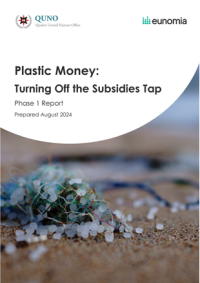Plastic Money: Turning Off the Subsidies Tap

This interim report represents the first comprehensive attempt to identify and quantify subsidies received by the primary plastics polymer (PPP) production industry. The report specifically examines the stages of production from the processing of raw plastic materials—such as steam cracking of naphtha, isolation of alkenes from raw natural gas, and coal gasification—through to the production of basic resins and the compounding and extrusion of plastic pellets. This segment of the industry is geographically concentrated and dominated by a small number of very large enterprises, some of which are state-owned.
The objective of this report is to fill the existing information gap as much as possible. It should be viewed as a work-in-progress, given the proprietary nature of some data, the importance of state-owned enterprises, and other transparency challenges. The study focuses on standard (‘commodity’) polymers that constitute the bulk of global polymer production: polyethylene (PE), polypropylene (PP), polyvinyl chloride (PVC), polyethylene terephthalate (PET), and polystyrene (PS).
Although subsidies also flow to both upstream and downstream of polymer production, they were beyond the scope of this study.

